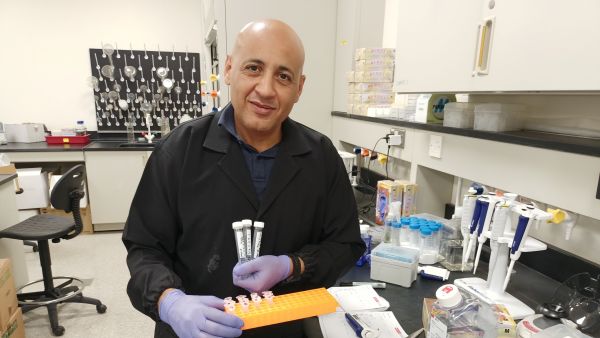A World First: Lenovo, Al Hathboor Bikal.ai, and Protium Technologies Unite to Revolutionize AI Peptide Drug Design in the Middle East

A new strategic partnership between Lenovo, Al Hathboor Bikal.ai, and Protium Technologies is setting a new benchmark in protein and peptide research across the Middle East. Powered by Lenovo’s ThinkSystem servers with Neptune technology and NVIDIA GPUs, the Maahr HPC cluster is enabling researchers to accelerate drug discovery timelines from months to minutes.
The collaboration, based at the Sharjah Research, Technology and Innovation Park (SRTIP), is part of Lenovo and Al Hathboor Bikal.ai’s broader mission to democratize access to HPC and AI across the region. By combining Lenovo’s infrastructure expertise with Al Hathboor Bikal.ai’s domain-specific AI models, the initiative is already making strides in developing novel peptide-based therapeutics for diseases such as Alzheimer’s.
Traditionally, the process of discovering and developing a new drug could span 10 to 15 years, encompassing early-stage research, preclinical studies, and multiple phases of clinical trials. Today, thanks to parallelized GPU computing, optimized code accelerators, and AI-guided iterative learning, researchers can simulate thousands of protein variants, refine enzyme efficiency, and optimize genetic modifications in a matter of minutes.
Muthana Shirzad, CEO and co-founder of Protium Technologies, said: “When we say, ‘from months to minutes,’ we’re talking about a fundamental shift in how science is done. In the past, simulating protein-peptide interactions could take two to three months on conventional systems. That meant researchers had to choose carefully what to simulate, often missing out on promising candidates simply due to time constraints. With the Maahr HPC cluster powered by Lenovo’s ThinkSystem servers, we can now run those same simulations in under an hour. This speed doesn’t just save time—it opens the door to exploring thousands of molecular possibilities, training AI models faster, and getting life-saving treatments to patients sooner. It’s a game-changer for the entire drug discovery pipeline.”
Protium Technologies focuses on peptides chain that join to form proteins that are crucial for various bodily functions including immune system support. The team is currently leveraging the Maahr HPC cluster to accelerate research into new therapeutic approaches for neurodegenerative diseases such as Alzheimer’s.
“Alzheimer’s disease is one of the most challenging neurodegenerative disorders we face today. It’s driven in part by the abnormal stacking of beta-amyloid peptides, which disrupt normal cellular function. Our approach is to design small peptides that can interrupt this stacking process, essentially breaking up the harmful aggregates before they cause damage. With the Maahr HPC cluster, we can simulate and test thousands of peptide variants in a very short time, something that would have taken months or even years before. This gives us the ability to iterate rapidly, refine our designs, and move promising candidates into experimental validation far more efficiently. It’s a major leap forward in our quest to find a cure,” said Shirzad.
The Maahr HPC platform is purpose-built for AI-driven protein engineering, integrating Intel CPUs for high-throughput parallel processing, NVIDIA GPUs for accelerated AI/ML workloads, high-speed HPC storage for seamless I/O performance, and Lenovo ThinkSystem Neptune water-cooled infrastructure for thermal efficiency and reduced power consumption.
This infrastructure delivers impressive performance metrics: 5x faster molecular dynamics simulations compared to CPU-only workloads, 3x reduction in AI model training times for protein structure prediction, and 40% lower power consumption thanks to advanced water cooling. The system also boasts 99.9% uptime, ensuring reliability for continuous scientific workloads.
In addition to the high-performance computing infrastructure, the broader Lenovo ecosystem plays a critical role in supporting the Maahr initiative. Lenovo ThinkPad PCs are used by researchers and engineers for remote access, data analysis, and real-time collaboration, while Lenovo’s professional services ensure seamless deployment, system optimization, and ongoing support. This end-to-end integration—from desktop to datacenter—enables a cohesive and efficient research environment.
Ashley Woodbridge, CTO, Lenovo META, said: “At Lenovo, we believe that technology should serve a higher purpose, solving the world’s most pressing challenges. This partnership exemplifies that vision. By combining Lenovo’s ThinkSystem Servers with Neptune technology with cutting-edge AI models, we’re not just accelerating computation, we’re enabling breakthroughs in life sciences that can transform lives. From fighting neurodegenerative diseases to democratizing access to advanced research tools, this collaboration is proof of what’s possible when innovation is driven by impact. We’re proud to support a future where science moves faster, solutions come sooner, and hope reaches further.”
By leveraging heterogeneous computing, Maahr reduces simulation runtimes significantly compared to standard computing environments. The synergy between multi-core CPU processing and GPU acceleration enhances deep learning model training and molecular simulations, enabling faster insights in protein engineering.
Raj Sandhu, CEO, Al Hathboor Bikal.ai, added: “This is more than just a technological upgrade, it’s a leap forward for life sciences in the region. By integrating Lenovo’s ThinkSystem Servers with our physics-based AI models, we’re enabling researchers to move from theoretical design to experimental validation in record time. What used to take months of computational effort can now be done in under an hour, allowing scientists to explore more possibilities, iterate faster, and ultimately bring new therapies to market sooner. This partnership is not only accelerating scientific discovery, it’s positioning the UAE as a hub for biotech innovation and advanced research in the Middle East.”
This collaboration is not only accelerating research but also reshaping the landscape of synthetic biology, drug discovery, and industrial biotechnology. The partnership also aligns with the UAE’s national innovation strategy, supporting high-tech job creation, sustainable healthcare solutions, and regional leadership in biotechnology. Together, Lenovo, Al Hathboor Bikal.ai, and Protium Technologies are not only accelerating scientific discovery but redefining what’s possible in medicine.
Background Information
Lenovo
At Lenovo, innovation isn’t just what we do, it’s part of our DNA. It doesn’t just make us who we are, it flows through everything we do—from the smartphone in your pocket and light bulbs in your smart home to the servers in your data center. And beyond.






